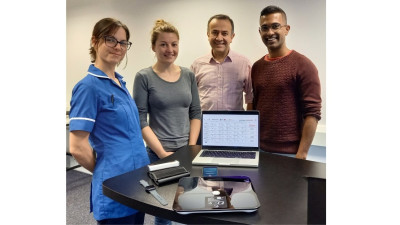Doctors are hoping a mobile phone app, which enables remote patient monitoring, will help people with severe liver disease avoid readmission to hospital.
As part of a new study launched this month by the Royal Free London and UCL, the CirrhoCare app will send an alert to doctors if a patient who has recently been discharged shows signs of deteriorating health.
The clinician can then provide specialist advice to the patient and can help them access community-based care, allowing them to get their liver function back on track ideally without needing to go back to hospital.
Patients with severe cirrhosis (scarring of the liver) are at high risk of deteriorating health after being discharged from hospital with more than a third usually requiring readmission within a month.
The new trial, with £2 million of funding from the UK’s National Institute for Health and Care Research (NIHR), involves more than 200 patients from at least 12 NHS trusts who are randomly allocated to either CirrhoCare or standard care.
This follows a small pilot study of Royal Free Hospital patients in 2020, which found that CirrhoCare reduced hospital readmissions by 38% over an average of 10 weeks. Furthermore it substantially reduced hospital resource requirements, such as outpatient fluid drainage, by 80%.
Professor Raj Mookerjee, consultant hepatologist at the RFH and chief investigator of the trial, said: “Current care for advanced cirrhosis patients being discharged from hospital is limited to scheduled appointments every couple of weeks and is entirely reactive. People are identified as needing treatment only when they are very unwell and require emergency admission.
“This novel approach using CirrhoCare seeks to spot signs of early deterioration so that patients needing treatment can receive prompt community-based intervention, so that further hospitalisations can ideally be prevented. In those with more severe deterioration, they can be prioritised for early hospital review, to offset emergency presentations.
“Deaths from liver disease have quadrupled since 1970 and are still increasing year on year. Liver disease is the third most common cause of premature death. However, there is significant regional variation in specialist liver services, with a disproportionate number of deaths occurring in the north of England.
“If CirrhoCare is shown to be effective, it will help ensure equal access to care. Whatever your postcode, you could have access to this platform and a specialist clinician.”
Before leaving hospital, patients on the CirrhoCare arm of the trial will receive a smartphone enabled with sim card, as well as a ‘smart’ watch enabling heart monitoring, digital blood pressure and temperature monitoring, and ‘smart’ scales which can capture weight and body fluid composition, in addition to an app to assess change in cognitive function in cirrhosis.
In addition, the kit records sleep status and physical activity, and patients answer questions when prompted via the app, for instance about how they feel or how much fluid they have drunk. The data is then analysed via algorithms which will flag to the clinical team if a complication may be occurring. A patient dashboard enables a quick, daily review by clinicians, if prompted, and the app allows for two-way, secure communication between patient and clinician.
Pamela Everett, 71, from Holborn, whose cirrhosis is as a result of non-alcoholic fatty liver disease, took part in the initial trial. She said: “I only found out I had fatty liver disease after a routine blood test. I felt OK to begin with but progressively I felt worse and that’s when I was put on the trial. I have to say I found it really helpful as it gave me peace of mind as I felt like I was being looked after 24/7. I did get a couple of phone calls during the trial because they noticed my blood pressure was quite low so we discussed that.
“The monitoring also reassured me I was getting plenty of sleep, which I was surprised about as I thought I wasn’t, and it also made me more mindful about what I was eating as my weight does go up and down a bit. To be honest I’d have happily carried on using it and I felt quite sad when it was time to give it back.”
The new trial will assess the clinical effectiveness of the CirrhoCare system in reducing liver-related complications requiring hospital intervention, and patients in both arms will be followed up for 12 weeks following discharge from hospital. In addition, cost-effectiveness will be assessed, as well as impacts on patients’ quality of life and disease severity.

The trial, led by researchers at UCL Division of Medicine, will be managed by the Comprehensive Clinical Trials Unit at UCL. It also involves researchers at the London School of Hygiene & Tropical Medicine.
 Translate
Translate